About our Project
Report on needs of partner AZHEIs
Purpose of the study
The purpose of this study is to investigate the sustainability of the current infrastructure of Azerbaijani Higher Education Institutes (AZHEIs) for establishment Institutional Repositories.
A detailed report on the needs of AZHEIs are prepared based on the results of the conducted survey on the size of existing research results, public access, publication activities, as well as the current experience in the management of research results.
A questionnaire survey was undertaken to collect basic information, including identifying the size of research output and the current practice of research output management in AZHEIs, technical capacity of AZHEIs and needs of partner HEIs of Azerbaijan.
The first phase of the project will consist of liaison with local institutions on their preferred hardware configuration, taking into account, for instance, the existing operating systems as well as of the tasks for the future will be to monitor the existing institutional repositories and their evolution: in this sense this work has served as the basis for future endeavours.
EU partners helped AZ partners in preparing surveys to conduct assessment studies.
Study objectives
The objectives of this study are to determine:
• the technical capacity of AZHEIs;
• the types of documents that could be archived in IRs in Azerbaijan;
• the infrastructural challenges that confront AZHEIs in Azerbaijan.
Methodology
A total of 66 respondents comprising library staff (digitization and e-resources units), teachers, researchers and IT specialists participated in this survey from the following seven AZHEI: Ganja State University, Nakhchivan State University, Lankaran State University, Mingachevir State University, Azerbaijan Technical University, Baku State University, Academy of the State Customs Committee of the Republic of Azerbaijan. 63 of participators answered in Azerbaijani, and 3 answered in English.
Summary of survey results
The questionnaire consists of 26 questions. Among partner universities, Nakhchivan State University and Mingachevir State University participated in the survey with 21%, Baku State and Azerbaijan Technical Universities with 17.7%, Lankaran State University with 12.9%, Academy of the State Customs Committee with 7% and Ganja State University with 2.7%.
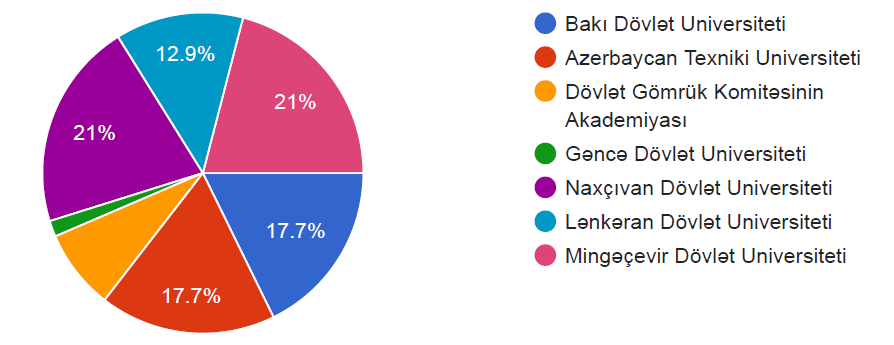
According to the conducted survey, it can be said that 61.3% of university teachers and professors actively participated in the survey. Along with teachers, 17.7% of IT specialists, 17.7% of librarians, and 3.3% of researchers were involved in the survey
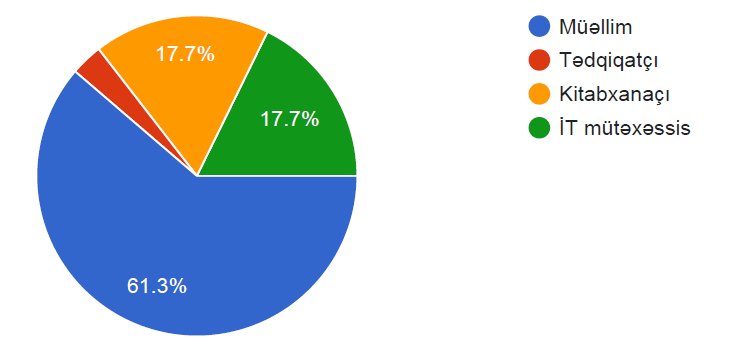
Institutional Repository
According to the results, almost 72.6% of the universities have information about the Institutional Repository (IR), its use, which information is placed, and its benefits. However, we see that 38.7% are aware of the existence of an Institutional Repository in some universities, and 35.5% do not know about its existence.
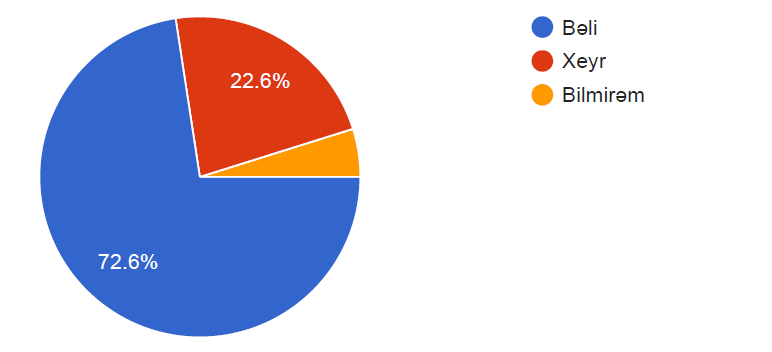
It can also be said from the questionnaire answers concerning knowledge about repository, 80.7% answered a digital library that collects, preserves and makes available scientific data of an enterprise, 24.6% a place to store and share research data, 15.8% a tool for managing and displaying research results, 8.8% gave different answers.
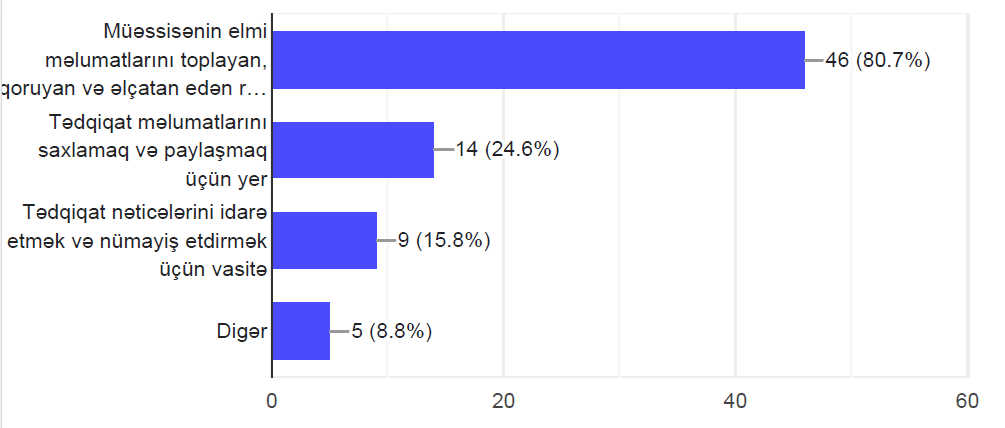
38.7% of those who took part in the survey stated that there are institutional repositories in the organization they represent, 25.8% stated that there isn’t, and 35.5% stated that they didn’t have information about it. 62.9% stated that institutional repository is not used at their universities, 29% stated that it is used, and 8.1% stated that they do not know whether it is used or not.
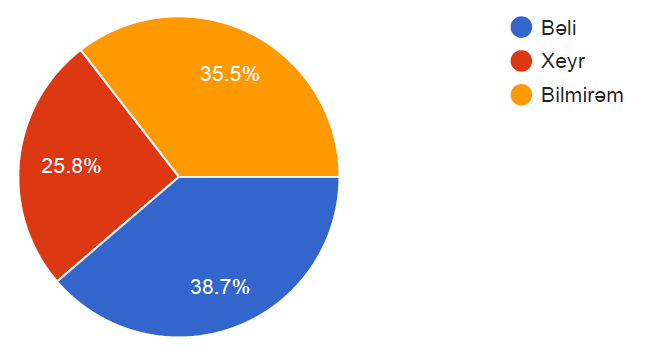
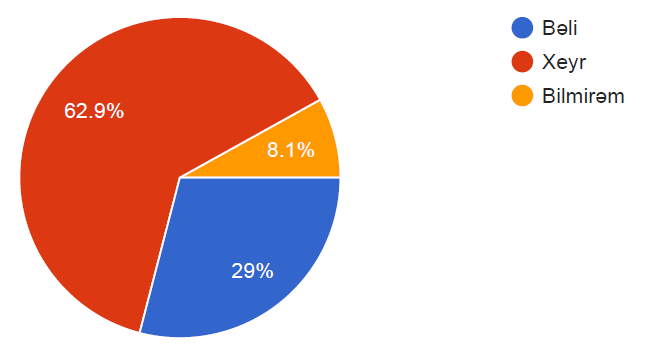
28.6% of the respondents who use the Institutional Repository “to get more information about the research conducted at the institution”, 28.6% “to get acquainted with and download the research results of other researchers”, 22.9% ” to download own research results from the institutional repository of their university (for example articles, books, conference documents, datasets), and 37.1% emphasized that they use it for other purposes.
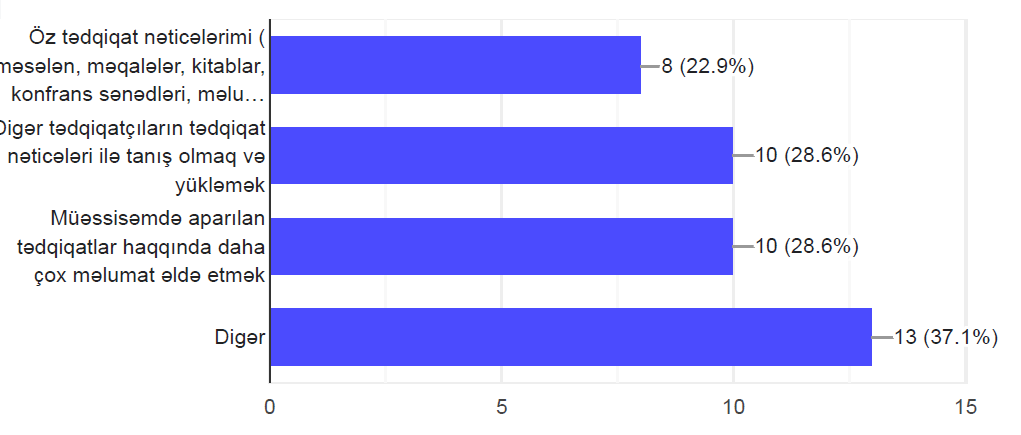
42.2% of the respondents who did not use the Institutional Repository stated that they were not aware of it, 17.8% did not have time to use it, 15.6% did not know how to use it and 24.4% chose other options.
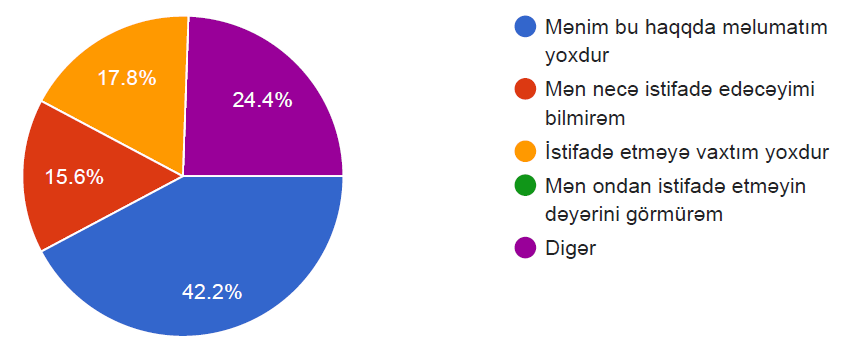
64.8% of respondents identifies the main benefit of institutional repositories as to increase recognition and dissemination of research, 53.7% to improve access to research for scientists worldwide, 38.9% to preserve research for future generations, and 3.7% they think about other directions.
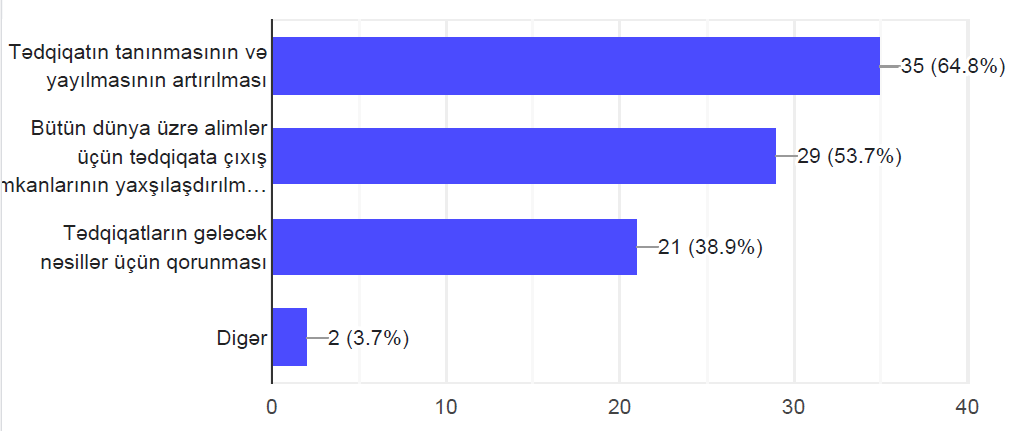
79% of those who answered the questionnaire are interested to include in electronic archive scientific books and for scientific journals, 51.6% symposium/conference materials, 48.4% abstracts/theses, 45.2% lectures and speeches, 40.3% for patents, 37.1% of video, audio materials, 35.5% for course materials, 33.9% of photos, pictures, slide collections, 27.4% for technical documents, 24.2% of teaching notes, 22.6% for data packages, 19.4% heritage materials/special collections, 17.7% book reviews, 16.1% institutional position, 11.3% for preliminary/post-print documents, 8.1% of other materials.
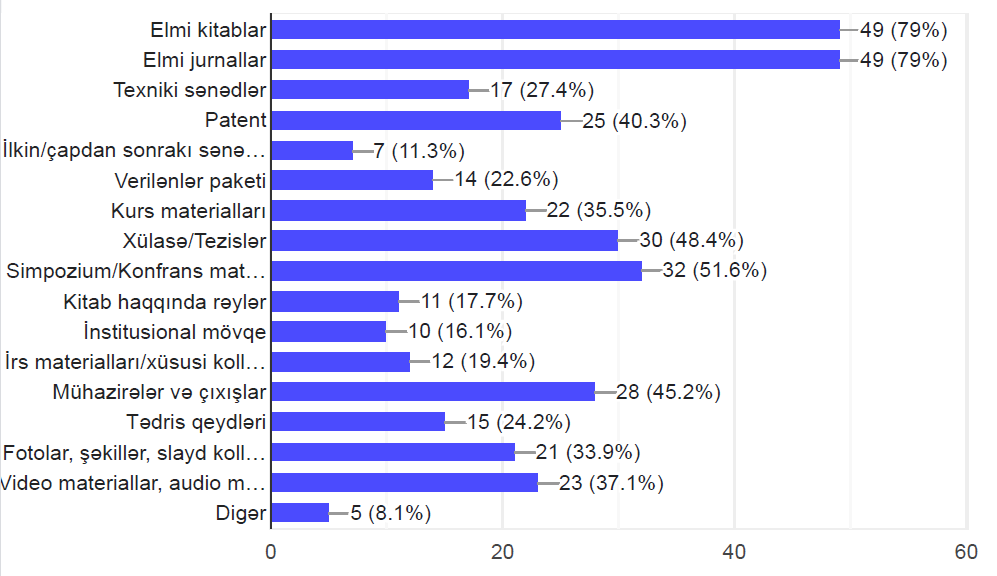
Analysis of the interview transcripts obtained from the interviews with IR managers and university librarians revealed that documents archived included theses and dissertations, research papers or articles, books, conference proceedings and other publications of the universities (e.g. speeches, lectures, committee reports, etc.). This was affirmed by the content analysis of the documents archived.
22.9% of repository users could deposit their own research results (e.g. articles, books, conference papers, datasets), 28.6% to view and download other researchers’ research results and to get more information about research conducted at his/her institution, 37.15 %.
This is clearly because students and faculty members are the main producers of knowledge within their universities in Azerbaijan.
The knowledge produced through research activities carried out by faculty members and librarians is usually packaged as theses, dissertations and research articles. This is not surprising, as the primary mandate of AZHEIs in Azerbaijan revolves around teaching, learning, research and community services.
Open Access
The Open Access questions were created as an important part of the questionnaire. These questions were created in response to the lack of information among teachers, students and early career researchers about scientific publishing and Open Access.
As showed survey result most part of participants (80,6%) have information about Open Access publications, more than half (58,1%) publish articles in open access journals and 40.3% are those who do not publish.
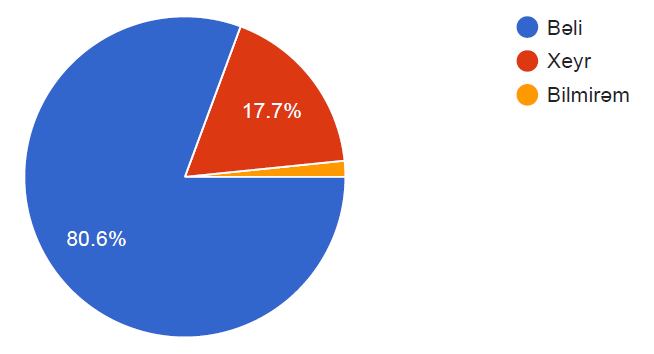
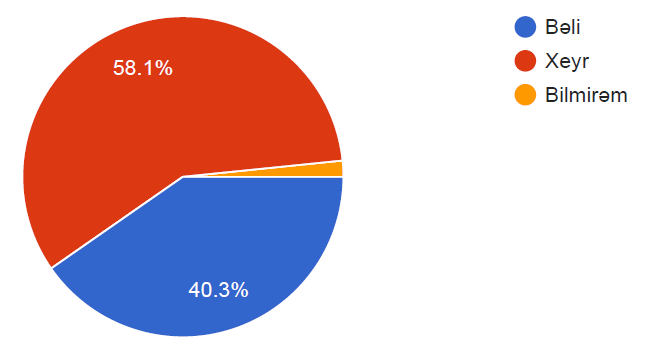
Unfortunately, most of the respondents (58,1%) do not publish articles in the public domain, a minority publish articles in open access journals. (40.3%). Librarians need to pay more attention to authors explaining the benefits of open access.
37.1% of participants engaged in the activity of checking the copyright of teachers’ research works and scholarships and placing them in open access IR, but 14.5% did not this work, and 48.4% did not have information.
While we think most people like the idea of OA (accessibility, openness, etc.) and support it in theory, in practice people are afraid that their research will appear less important/impressive if published in less traditional places. We need to change this through DIRNA project!
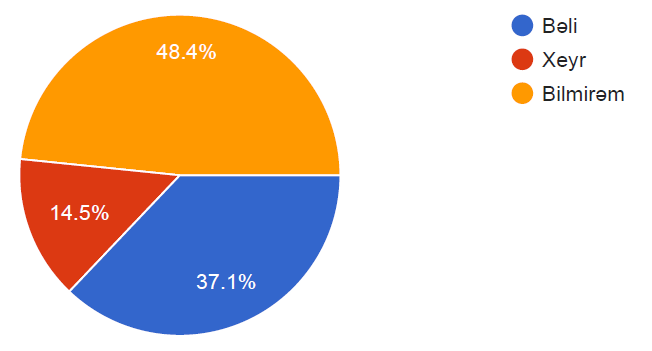
71% of the respondents stated that there is a “Plagiarism Checker” program in their universities, 8.1% there isn’t, and 21% did not know about it.
Technical capacity
The “Technical Capacity” section of the survey focused on the specific technical resources (data tools) used by our member institutions to manage and work with institutional data. The purpose of this section was to understand the range of technical resources and identify areas for support.
Analysis of the interview answers revealed that 72, 6 % of the respondents have High-speed (fiber optic) Internet service on a dedicated line that provide the sustainability of the future IRs in Azerbaijan, 11.3% didn’t have, and 16.1% did not know about it.
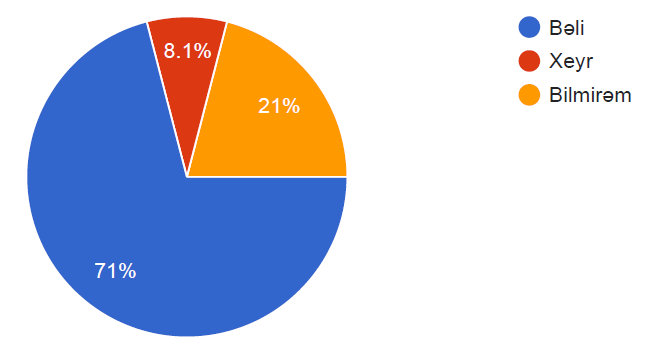
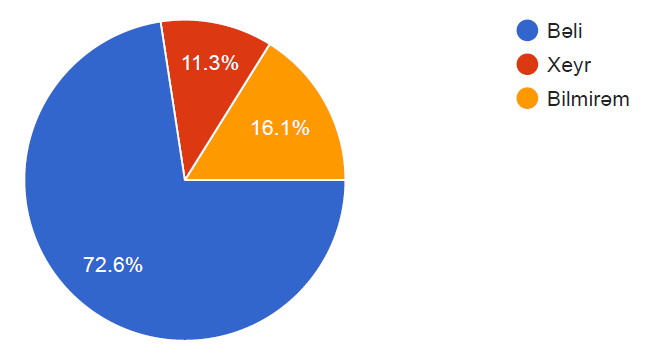
Survey showed lack of technical staff for system development and management of research outputs poses a great challenge to the sustainability of repositories in AZHEIs.
Many institutions reported that they did not anticipate any challenges (related to technical capacity), such as OS Linux (Debian, Ubuntu, CentOS), about whether they would face any specific challenges. However, institutions reported that the most challenging issues are:), lack of institutional data capacity, some technical problems with the Internet connection.
For every researcher, teacher and staff from the partner universities, 48.4% of those who have Microsoft Office 365 licensed accounts are 48.4%, 17.7% didn’t have, and 33.9% did not know about it.
98.4% of the respondents stated that there is a corporate e-mail service at the University domain, and 1.6% did not know about it.
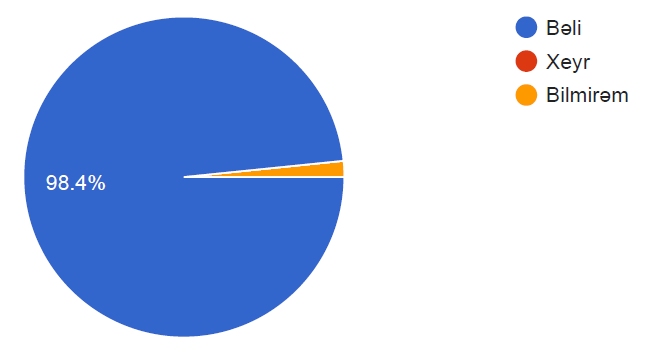

72.6% respondents stated that they had experience protecting digital photos, images, data, etc. 25.8% didn’t have it and 1.6% did not know about it.
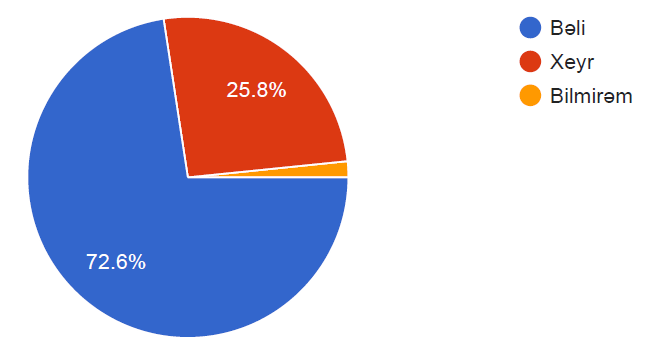
Attended respondents stated that for project 53.2% of data is kept on a desktop hard drive, 51.6% is on the cloud, 45.2% is on a USB flash drive, 27.4% is on an institutional server, 24.2% is on an institutional network, and 21% is on a CD/DVD. 8.1% said they didn’t know.
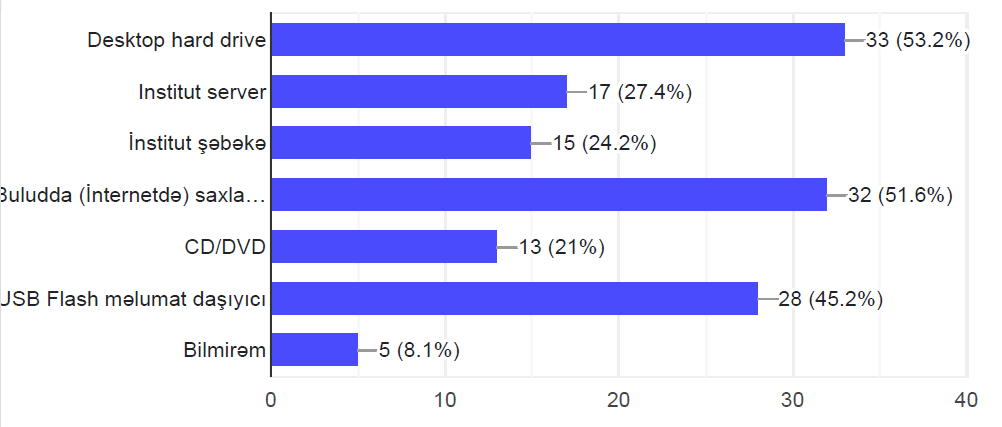
19.4% of respondent’s data backups connecting their projects “daily”, 19.4% “weekly”, 16.1% “monthly”, 12.9% “every year”, 3.2% “never”. kept and 29% weren’t aware of it.
Many institutions reported that they did not anticipate any challenges (related to technical capacity), such as OS Linux (Debian, Ubuntu, CentOS), about whether they would face any specific challenges.
50% of respondents stated that their universities have an IT employee with experience working OS Linux (Debian, Ubuntu, CentOS), 46.8% didn’t, and 3.2% did not know about it.
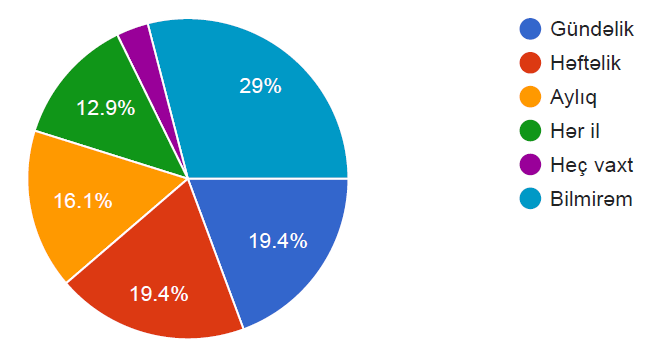
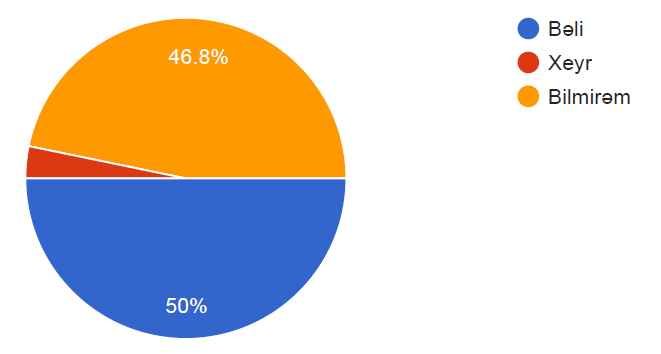
38.7% respondents for “DIRNA” project (Frontend part) any free resources in the existing IT infrastructure of universities – vCPU-2Core; RAM-8Gb; SSD-30Gb volume, 4.8% stated wasn’t, and 56.5% stated that they weren’t aware of it.
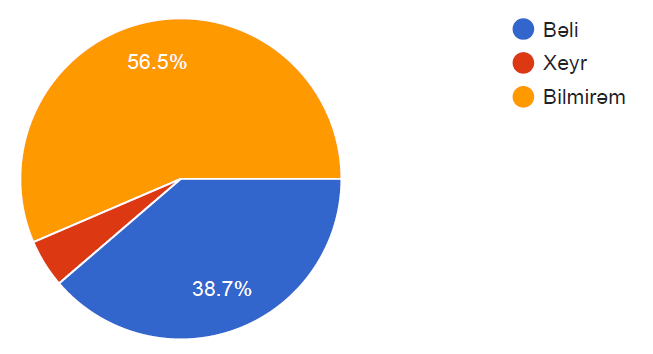
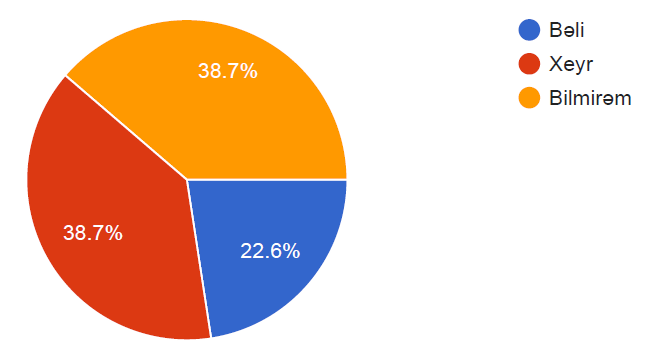
22.6% of respondents stated that any cloud service (GCP, AWS, Oracle, Azure, etc.) is used in the IT infrastructure of their universities, 38.7% isn’t used and 38.7% stated that they weren’t aware of it. The majority of participants are using Oracle service (33, 3%).
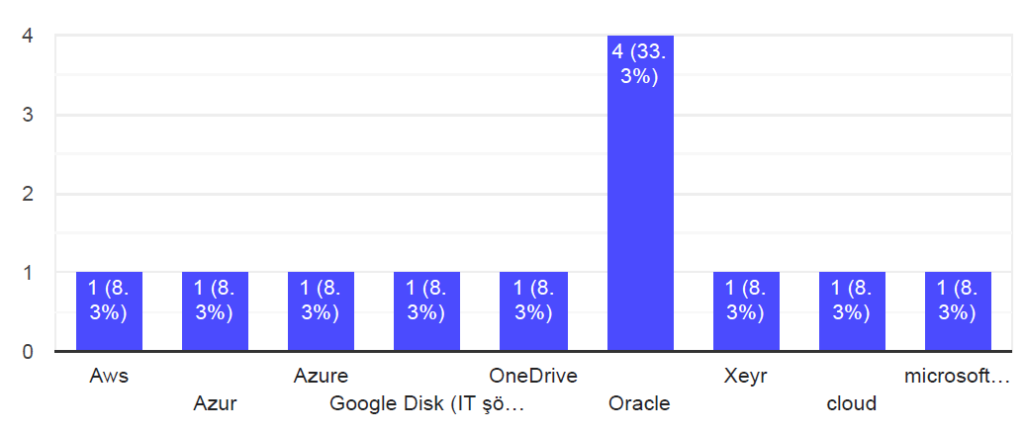
Most (77,4%) institutions reported not maintaining a cloud database or don’t know about it, but among those maintaining cloud services (GCP, AWS, Oracle, Azure, etc.)
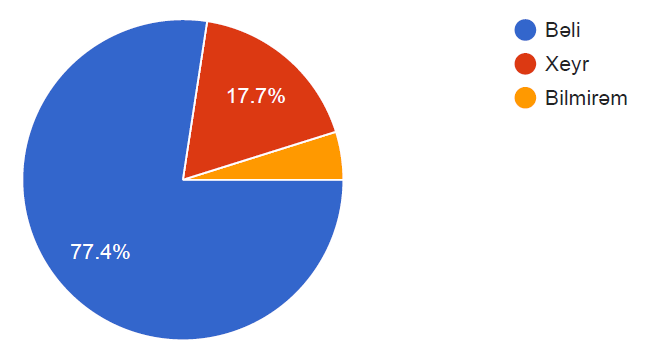
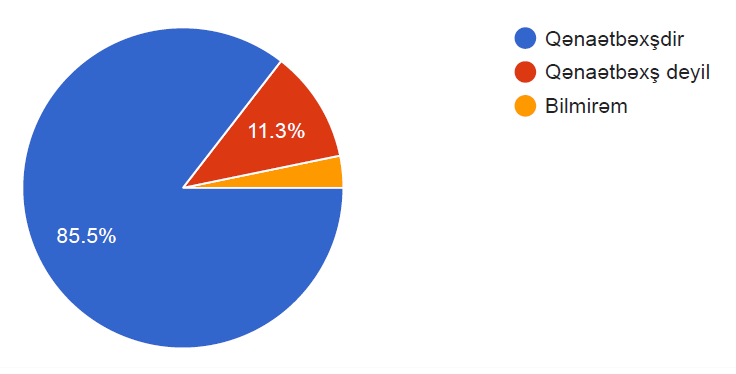
Survey participants reported that most of all (77.4%) have antivirus software on their computers, 17.7% weren’t, and 4.9% weren’t aware of it.
Technical support for IT services in universities is satisfactory for 85.5% and 11.3% for unsatisfactory.
Survey results regarding the technical resources used by our member institutions is helpful for planning future programming, annual conference topics/speakers, and other initiatives. They also help us understand the technical capacity of our member institutions to implement high-quality data analytics to support evidence-based approaches to achieving equitable outcomes.
Conclusion
45.2% respondents attended in the survey stated that they need training topics on “Publication of data in the institutional repository”, 59.7% on “Rules for working with the institutional repository”, and 43.5% on “Trainings on Publication of open access materials” in the DIRNA project. Within the framework of the DIRNA project, the respondents proposed the establishment, management and localization of the new open access institutional repository system in the partner higher education institutions, the implementation of educational measures that will eliminate the deficiencies in the universities related to the institutional repository, and the involvement of the staff who should conduct the work in trainings and seminars for the successful completion of the project.
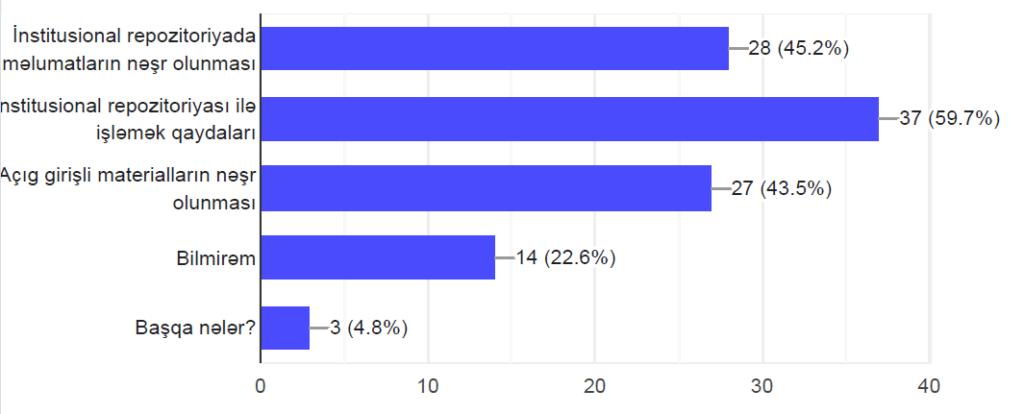
There is no doubt that OA to scholarly and academic information has attracted the attention of AZHEIS in Azerbaijan. This is evident by the increasing information of IR. 72 % of respondents are aware about IRs. As revealed in this study, among all the universities surveyed representing just one of universities has fully functional IRs and digitization units. This offered universities the opportunity to showcase their intellectual resources to a worldwide audience, thereby improving upon its visibility and prestige. However, to ensure the sustainability of these IRs, it was important to examine the capacity of the IR infrastructure to respond to future trends and demands. The study revealed that the infrastructure of universities have the capacity to expand when the need arises. However, there is a need for continuous investment into the current universities infrastructure to sustain the gains and ensure the longevity or sustainability of future IRs in Azerbaijan.
Recommendations
Although the recruitment of qualified librarians seems to be a panacea for the lack of technical staff required for the development and management of IRs, there is still the need for continuous professional development training. It is, therefore, recommended that professional associations in Azerbaijan such as the Azerbaijan Library and Information Consortium make the organization of training workshops or webinars on emerging IR trends a key component of its yearly activities.
Technological advancement has brought about an increasing array of systems and applications that have become associated with libraries. This calls for librarians to have theoretical and practical knowledge in the use and management of these systems. It is, therefore, recommended that the training for librarians in Azerbaijan be revised periodically to reflect emerging technological trends in Azerbaijan.


